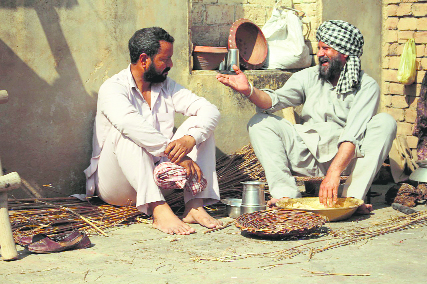
A still from Siri
Gurnaaz Kaur
Paving the way for a fresh narrative, National Award-winning director Rajeev Kumar is dedicated to creating a new movement in the Punjabi film industry. His debut film Nabar gave him a loyal following and also the strength to create meaningful cinema. His latest release Siri, which took over a year for him to releases since getting funds for such subjects isn’t easy, highlights the agrarian crisis, not just of small farmers, but, more importantly, of farm workers.

“People know about the deaths and suicides of small farmers, but the labourers who work with them…No one has ever focused on them.” As he researched on the topic and found data from three universities in Punjab (GNDU, Punjabi University and PAU), he says it was a shock to know that the number of suicides by labourers, due to debt, was more than the number of suicides by the farmers. “The traditional meaning of the word Siri is working partners and the truth is that there are two victims in the ongoing struggle,” he laments.

Apart from depicting the crisis, Rajeev has also included the causes—adverse effects of the Green Revolution, corrupt officials in the agriculture sector, supply of poor seeds; exploitation by agriculture experts, poor compensations, corporate nexus, faulty government policies and a lot more. “We want to inspire those on whom this film has been made, so that they can fight for their lives and rights.”
Taking up an issue
An alumnus of the Indian Theatre Department, Panjab University, Rajeev’s love for issue-based theatre led him to make similar films. “I’ve done theatre with Gursharan Singh. His theatre included social issues and so did many other theatre groups in Punjab. But such subjects weren’t dealt with in mainstream cinema. Those were stereotypes, either comedy or romanticising a bygone era of Punjab. The current situation was of no one’s interest and that encouraged me to take it upon myself to do something about it,” he asserts.
Before donning the director’s hat, he had spent 10 years in the TV industry, officiatingat senior positionsand generating content.In 2010, with much experience, he knew it was time to go back to the reason of moving to Mumbai- depicting the true state of Punjab on the big screen.
Today, 10 years later, in his repertoire are films such as Nabar, Aatu Khoji, Saavi and Chumm. If in Nabar he brought forward the struggles of a poor farmer who fights for his son, in Saavi, an 18-year-old girl protagonist who is married to a four-year-old, he brings to light the age-old tradition of Muslim Gujjar families in the region, who still practise barter of women. His short film Aatu Khoji is about the time in Punjab where there were rural investigators, who found thieves and other culprits by following footprints. Chumm is a film that revolves around the plight of the Dalit community. This self-funded film, besides being screened at Cannes, has been shown in France, Canada and other international film festivals. But what is exceptional about it is its screening in over 300 villages where the audience comprised Dalit women. “This was an effort to simplify my cinema,” he says. “Although my films were being appreciated, shortlisted by festivals, but these are the stories of commoners and their struggles. Those are the people who do not have the spending power and rarely go to experience a film in a multiplex; therefore I decided to take the film to them,” he adds.
Up next
Excited about his latest film, he says, “Siri is so relevant to this time when farmers are fighting for their rights. The agitation has a deep-rooted connectionto the World Trade Agreement, but not many know about it or talk about it. There’s a lot of politics at play. As the film is reaching the villages of Punjab (there have already been eight screenings in one month), I see a possibility of people getting aware of the real cause.”
There may be challenges in creating socially relevant cinema, considering there aren’t producers to back such projects, but Rajeev is satisfied because he is giving to his audience a hope for change and, above all, a true depiction of the state of affairs!
Join Whatsapp Channel of The Tribune for latest updates.



























